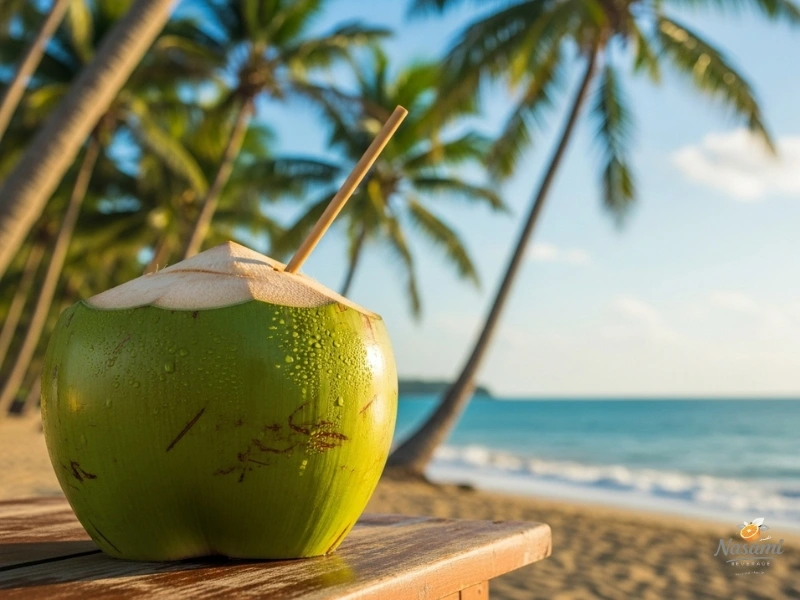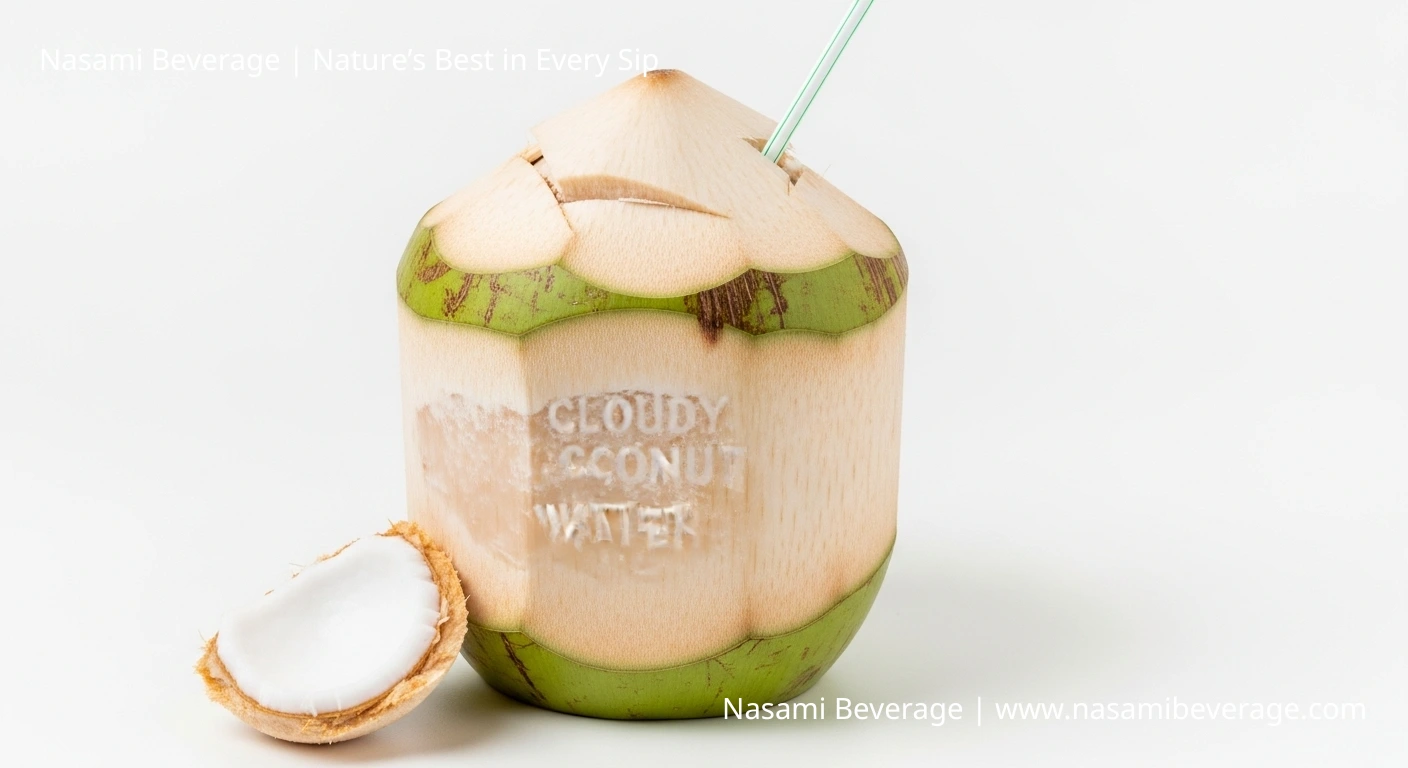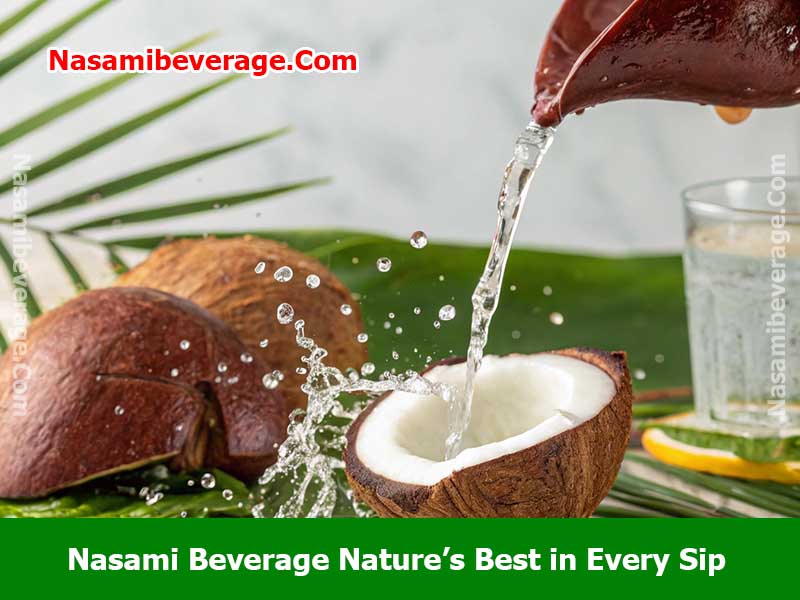In the ever-expanding world of wellness drinks, few have captured attention quite like pure coconut water. Hailed as nature’s sports drink, this tropical beverage has moved from beachside treat to a global health staple. Brands like Nasami Beverage have embraced this trend, offering consumers a taste of natural hydration. But what’s the real story behind this popular drink? This guide will explore everything you need to know about pure coconut water, from its impressive health benefits to how to choose the best bottle on the shelf.
Disclaimer: This information is for educational purposes only and does not replace professional medical or veterinary advice. Always consult a qualified professional before making decisions related to your health or your pet’s health.
What Exactly Is Pure Coconut Water?
Often confused with its creamier cousin, coconut milk, pure coconut water is a distinct and naturally occurring liquid. Understanding its origin is key to appreciating its unique properties.
From Green Coconuts, Not Brown Ones
Pure coconut water is the clear, slightly sweet liquid found inside young, green coconuts (Cocos nucifera). This liquid serves as the nourishment for the developing coconut fruit. As the coconut matures and turns brown, this water is gradually absorbed and replaced by the white coconut meat or flesh. Therefore, the most nutrient-rich water comes from coconuts that are around 6-9 months old.
The Key Difference: Coconut Water vs. Coconut Milk
The distinction is simple but important. Coconut water is about 94% water and is naturally low in fat and calories. [1] In contrast, coconut milk is a manufactured product created by grating the flesh of mature brown coconuts and mixing it with water. The result is a creamy, high-fat, high-calorie liquid commonly used in cooking, particularly in Asian and Caribbean cuisines.
The Science-Backed Health Benefits of Pure Coconut Water
The popularity of pure coconut water isn’t just hype; it’s supported by its impressive nutritional profile and associated health benefits.
Nature’s Sports Drink: A Powerhouse of Electrolytes
One of the most celebrated benefits is its high electrolyte content. Electrolytes are minerals that are vital for bodily functions, such as maintaining proper fluid balance and muscle function. Pure coconut water is particularly rich in potassium, containing more than most sports drinks and even more than a banana. [2] It also contains smaller amounts of sodium, magnesium, and calcium, making it an excellent choice for rehydration.
Superior Hydration for a Healthy Lifestyle
Because of its electrolyte and water composition, coconut water is an effective beverage for hydration. Studies have shown it can be as effective as traditional sports drinks for rehydration after moderate exercise, and it is often easier on the stomach. [3] This makes it a great natural option for athletes and anyone needing to replenish fluids.
Supports Heart Health and Blood Pressure
The high potassium content is a major win for cardiovascular health. Potassium helps to counteract the effects of sodium in the body, which can help lower blood pressure in individuals with high or normal blood pressure. [4] Maintaining a healthy blood pressure is crucial for reducing the risk of heart disease.
A Low-Calorie Option for Weight Management
Compared to sodas, juices, and many other sweetened beverages, pure coconut water is low in calories and sugar. An 8-ounce serving typically contains between 45 to 60 calories. [5] Swapping high-calorie drinks for coconut water can be a simple strategy to reduce overall calorie intake, which supports healthy weight management.
Potential for Kidney Stone Prevention
Adequate fluid intake is the most important factor in preventing kidney stones. Early research suggests that coconut water may be even better than plain water for this purpose. It has been shown to prevent crystals from sticking to the kidneys and other parts of the urinary tract, and it helps flush out citrate, potassium, and chloride, which can contribute to stone formation. [6]
Nutritional Breakdown: What’s Inside?
To truly understand the benefits, let’s look closer at the nutritional content of a standard serving of pure coconut water.
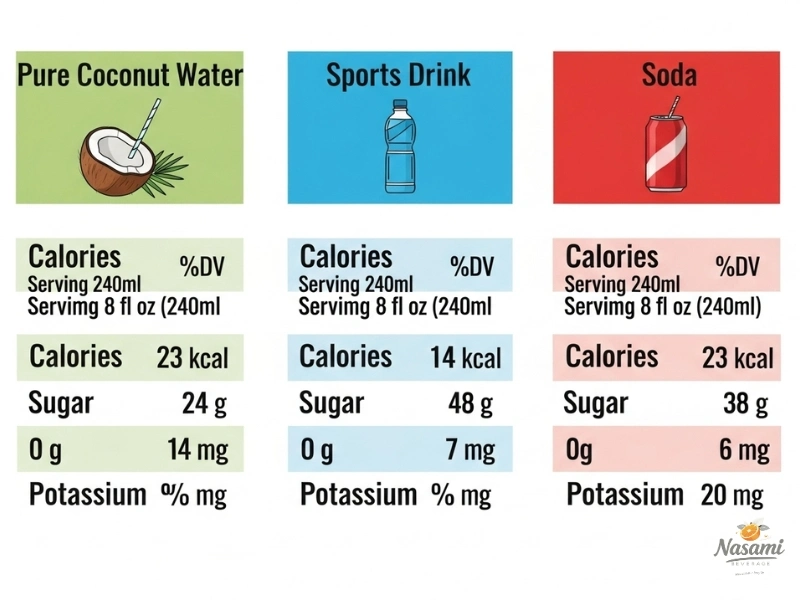
Calorie and Macronutrient Profile
A typical 8-ounce (240ml) serving of unsweetened coconut water contains:
- Calories: 45–60
- Carbohydrates: 9–14 grams
- Sugar: 6–12 grams (natural, not added)
- Fat: 0 grams
- Protein: Less than 2 grams
Vitamins and Minerals: A Deep Dive into Potassium
The real star is the mineral content. That same 8-ounce serving provides:
- Potassium: Around 600 mg, which is about 13% of the Daily Value (DV).
- Magnesium: About 15% of the DV.
- Manganese: About 17% of the DV.
- Sodium: About 11% of the DV.
- Calcium: About 6% of the DV.
This mineral-rich profile is what sets it apart as a superior hydration source.
How to Choose the Best Pure Coconut Water: A Buyer’s Guide
The market is flooded with options, but not all coconut water is created equal. Here are five key things to look for to ensure you’re getting a high-quality product.
1. Read the Label: ‘100% Coconut Water’ is Key
The most important step is to check the ingredients list. It should have one ingredient: coconut water. If you see anything else, like “natural flavors,” sweeteners, or preservatives, it’s not pure.
2. Avoid ‘From Concentrate’
Coconut water labeled “from concentrate” has been pasteurized at high heat, stripped of its water content, and then reconstituted later. This process can destroy some of the delicate vitamins, minerals, and enzymes, altering both the taste and nutritional value. Always opt for products that are “not from concentrate.”
3. Check for Added Sugars and Flavors
Many brands offer flavored versions (like pineapple or mango), which almost always contain added sugars or artificial sweeteners. To get the full health benefits without unnecessary calories, always choose plain coconut water.
4. Understand the Packaging: Cans, Bottles, and Tetra Paks
Tetra Paks are a popular choice as they are aseptic and protect the liquid from light and air, preserving its nutrients and flavor without refrigeration until opened. Cans are also effective, but be sure they are BPA-free. Glass bottles are excellent but can be heavier and more fragile.
5. Why ‘Organic’ Matters
Choosing organic coconut water ensures that the coconuts were grown without the use of synthetic pesticides and fertilizers. This is not only better for the environment but also reduces your exposure to these chemicals. Many high-quality brands, including Nasami Beverage, prioritize organic sourcing.
Top Brands on the Market: A Quick Review
Navigating the beverage aisle can be overwhelming. Here’s a look at some of the most prominent brands known for their pure coconut water.
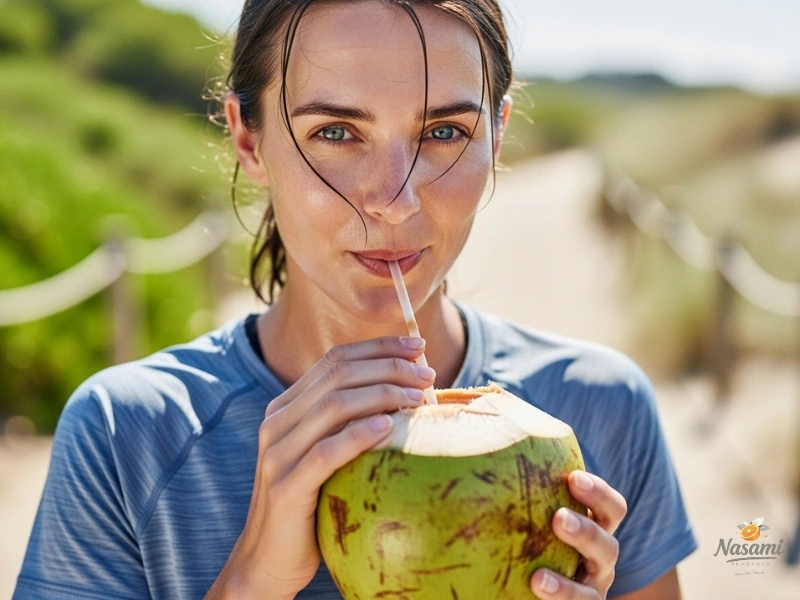
The Premium Choice: Harmless Harvest
Known for its distinctive pink hue (a natural result of antioxidants interacting with light), Harmless Harvest is famous for its raw, organic, and fair-trade certified product. It’s often praised for having a taste closest to drinking directly from a fresh coconut.
The Popular Favorite: Vita Coco
As one of the most widely available brands, Vita Coco is a household name. They offer a reliable and consistent product that is never from concentrate and comes in a variety of sizes and flavors.
The Authentic Option: Goya
Goya offers a pure coconut water that often includes small, tender pieces of young coconut pulp, adding a unique texture. It’s a favorite among those who enjoy the added chewiness and authentic feel.
The Neutral All-Rounder: C2O
C2O sources its coconuts from inland Thai farms, which they claim gives their water a sweeter, nuttier flavor. It’s a great all-around choice that is 100% pure and widely available.
Incorporating Coconut Water into Your Daily Life
Beyond just drinking it straight from the container, there are many ways to enjoy the benefits of coconut water.
The Best Time to Drink It: Morning, Post-Workout, or Afternoon Slump?
There’s no wrong time, but certain times can maximize its benefits. Drinking it first thing in the morning can help rehydrate your body after a night’s sleep. As a post-workout recovery drink, it replenishes lost fluids and electrolytes. It can also be a healthy alternative to coffee during an afternoon energy slump.
Beyond the Bottle: Simple Recipes and Ideas
Pure coconut water is a versatile ingredient:
- Smoothies: Use it as a liquid base for your favorite fruit and vegetable smoothies. It adds natural sweetness and a nutrient boost without the thickness of milk or yogurt.
- Ice Cubes: Freeze coconut water in ice cube trays and add them to water, iced tea, or other beverages for a subtle flavor and electrolyte kick.
- Cooking: Use it to steam vegetables or as a liquid in rice or quinoa recipes for a light, tropical flavor.
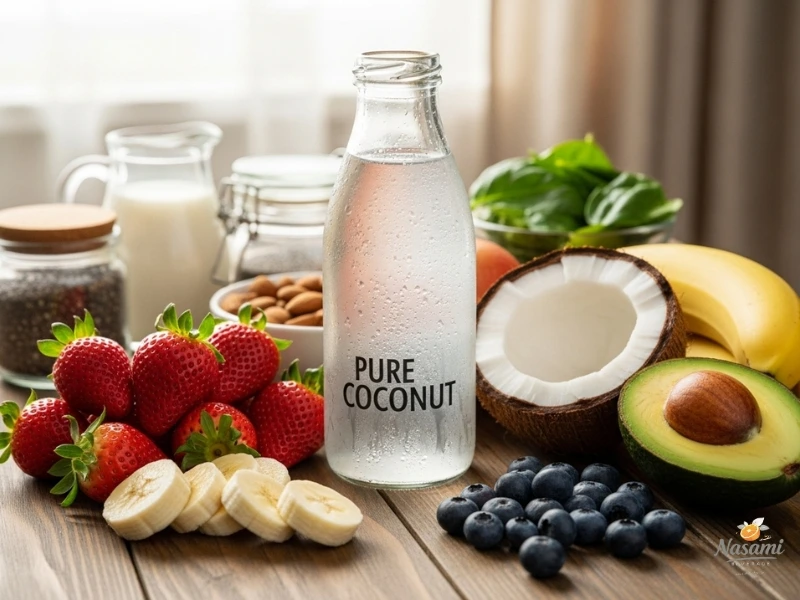
Frequently Asked Questions (FAQs)
Is it okay to drink pure coconut water every day?
For most people, drinking a serving of coconut water daily is safe and healthy. It’s a great way to boost potassium intake and stay hydrated. However, it contains calories, so it should be consumed in moderation as part of a balanced diet and should not completely replace plain water.
What’s the difference between pure coconut water and coconut milk?
Pure coconut water is the naturally fat-free, clear liquid from young green coconuts. Coconut milk is a processed, creamy, high-fat liquid made from the flesh of mature brown coconuts. [1]
Does pure coconut water have a lot of sugar?
Unsweetened coconut water is relatively low in sugar compared to fruit juices and sodas. An 8-ounce serving contains about 6-12 grams of naturally occurring sugars. [5] Always check the label to ensure no sugar has been added.
Can coconut water replace a sports drink?
For casual exercise, it is an excellent natural alternative due to its high potassium content. [2] For prolonged, high-intensity exercise (over 90 minutes), a traditional sports drink might be better as they are specifically formulated with higher levels of sodium, the main electrolyte lost through heavy sweating.
This article was compiled by the Nasami Beverage team to help readers explore the topic: pure coconut water
